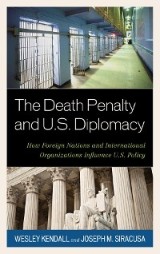Details

The Death Penalty and U.S. Diplomacy
How Foreign Nations and International Organizations Influence U.S. Policy|
89,99 € |
|
| Verlag: | Rowman & Littlefield Publishers |
| Format: | EPUB |
| Veröffentl.: | 12.09.2013 |
| ISBN/EAN: | 9781442224360 |
| Sprache: | englisch |
| Anzahl Seiten: | 176 |
DRM-geschütztes eBook, Sie benötigen z.B. Adobe Digital Editions und eine Adobe ID zum Lesen.
Beschreibungen
<span><span>This unique book examines how U.S. domestic policy regarding the death penalty has been influenced by international pressures, in particular, by foreign nations and international organizations. </span></span>
<br>
<span><span>International pressure has mounted against America’s use of the death penalty, straining diplomatic ties. U.S. policies that endorse the execution of juveniles, the mentally handicapped, and disadvantaged foreign nationals have been recognized by allied nations and international organizations as human rights abuses and violation of international law. Further, organizations such as the United Nations and Amnesty International have issued scathing reports revealing racial bias and fundamental procedural flaws in almost every phase of the judicial process in capital cases. International pressures directed at governmental entities, in particular specific states such as Texas, can have a profound impact on governmental operational efficiency and public opinion and effectively render capital punishment cost-prohibitive from a public policy standpoint. </span></span>
<br>
<span></span>
<br>
<span><span>The Death Penalty and U.S. Diplomacy</span><span> analyzes the institutional response to specific forms of foreign intervention and influence such as consular intervention, international litigation, and extradition negotiation. This is documented through case studies such as how a judge in </span><span>Texas v. Green</span><span> turned to a comparative Delaware case that relied on the Vienna Convention to remove the death penalty as possible punishment, and how Mexico pressured the White House in two separate cases. </span></span>
<br>
<span></span>
<br>
<span><span>By demonstrating that foreign actors have done much to constrain the United States to abandon its policies of executing foreigners, as well as its own citizens, the book explores the foreign dimensions of the U.S. death penalty while advancing the debate surrounding the viability of this controversial policy. </span></span>
<br>
<span></span>
<br>
<span></span>
<br>
<span><span>International pressure has mounted against America’s use of the death penalty, straining diplomatic ties. U.S. policies that endorse the execution of juveniles, the mentally handicapped, and disadvantaged foreign nationals have been recognized by allied nations and international organizations as human rights abuses and violation of international law. Further, organizations such as the United Nations and Amnesty International have issued scathing reports revealing racial bias and fundamental procedural flaws in almost every phase of the judicial process in capital cases. International pressures directed at governmental entities, in particular specific states such as Texas, can have a profound impact on governmental operational efficiency and public opinion and effectively render capital punishment cost-prohibitive from a public policy standpoint. </span></span>
<br>
<span></span>
<br>
<span><span>The Death Penalty and U.S. Diplomacy</span><span> analyzes the institutional response to specific forms of foreign intervention and influence such as consular intervention, international litigation, and extradition negotiation. This is documented through case studies such as how a judge in </span><span>Texas v. Green</span><span> turned to a comparative Delaware case that relied on the Vienna Convention to remove the death penalty as possible punishment, and how Mexico pressured the White House in two separate cases. </span></span>
<br>
<span></span>
<br>
<span><span>By demonstrating that foreign actors have done much to constrain the United States to abandon its policies of executing foreigners, as well as its own citizens, the book explores the foreign dimensions of the U.S. death penalty while advancing the debate surrounding the viability of this controversial policy. </span></span>
<br>
<span></span>
<br>
<span></span>
<span><span>The Death Penalty and U.S. Diplomacy</span><span> analyzes the institutional response to specific forms of foreign intervention and influence such as consular intervention, international litigation, and extradition negotiation. This is documented through case studies such as how a judge in </span><span>Texas v. Green</span><span> turned to a comparative Delaware case that relied on the Vienna Convention to remove the death penalty as possible punishment, and how Mexico pressured the White House in two separate cases. </span></span>
<br>
<span></span>
<br>
<span></span>
<br>
<span></span>
<br>
<span></span>
<span><span>1. Introduction<br></span></span>
<br>
<span><span>2. International Influence on U. S. Judicial Policymaking</span></span>
<br>
<span></span>
<br>
<span><span>3. Public Opinion, the Death Penalty and International Influence</span></span>
<br>
<span></span>
<br>
<span><span>4. Foreign Actors, U. S. Bureaus and Death Penalty Policies</span></span>
<br>
<span></span>
<br>
<span><span>5. Foreign Consul Influence on Death Penalty Policies</span></span>
<br>
<span></span>
<br>
<span><span>6. U. S. Death Penalty Policy and International Litigation</span></span>
<br>
<span></span>
<br>
<span><span>7. Extradition and U. S Death Penalty Policies</span></span>
<br>
<span></span>
<br>
<span><span>8. Conclusion </span></span>
<br>
<span><span><br>Selected Bibliography<br></span></span>
<br>
<span></span>
<br>
<span><span>2. International Influence on U. S. Judicial Policymaking</span></span>
<br>
<span></span>
<br>
<span><span>3. Public Opinion, the Death Penalty and International Influence</span></span>
<br>
<span></span>
<br>
<span><span>4. Foreign Actors, U. S. Bureaus and Death Penalty Policies</span></span>
<br>
<span></span>
<br>
<span><span>5. Foreign Consul Influence on Death Penalty Policies</span></span>
<br>
<span></span>
<br>
<span><span>6. U. S. Death Penalty Policy and International Litigation</span></span>
<br>
<span></span>
<br>
<span><span>7. Extradition and U. S Death Penalty Policies</span></span>
<br>
<span></span>
<br>
<span><span>8. Conclusion </span></span>
<br>
<span><span><br>Selected Bibliography<br></span></span>
<br>
<span></span>
<span><span>Wesley Kendall</span><span> is an experienced American trial lawyer (Juris Doctor) and currently assistant professor and law studies program director at the University of West Virginia. He was formerly a law lecturer at the Royal Melbourne Institute of Technology University’s Vietnam campus, in Hanoi.<br><br></span><span>Joseph M. Siracusa</span><span> is professor of human security and international diplomacy and associate dean of international studies at the Royal Melbourne Institute of Technology University, Australia. American-born, he is the author and coauthor of many books, including </span><span>Crime Wars: The Global Intersection of Crime, Political Violence, and International Law </span><span>(with Paul Battersby and Sasho Ripiloski, 2011); </span><span>Diplomacy: A Very Short Introduction</span><span> (2010); and </span><span>Globalization and Human Security</span><span> (with Paul Battersby, 2009).<br><br><br></span></span>

















